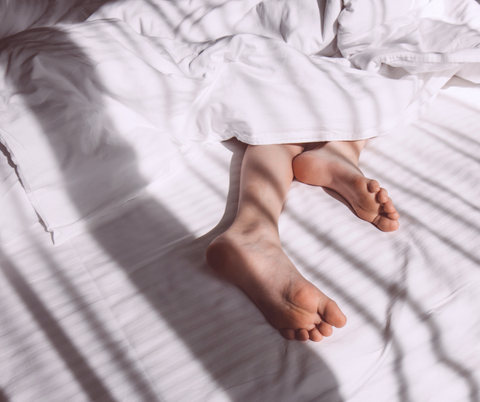Studies show that 50-70 million Americans suffer from a chronic sleep disorder. Many factors can contribute to sleep disruptions, and they vary by sleep disorder. These factors include stress, medical conditions, certain lifestyle choices, neurological issues, and genetics. Four sleep disorders plague a significant chunk of the American population:
-
Insomnia
-
Sleep Apnea
-
Restless Leg Syndrome
-
Narcolepsy
These disorders may manifest differently and have various causes, but what they do have in common is their detriment to sleep quality. Let's describe each sleep disorder and provide viable treatment options for each.
1. Insomnia
Insomnia is a sleep disorder characterized by difficulty falling asleep or staying asleep. It can significantly impact an individual's quality of life, causing daytime fatigue, mood changes, and difficulty concentrating. Various factors, including stress, anxiety, medication, and medical conditions, can cause insomnia.
Several treatment options are available for insomnia, including pharmacological and all-natural interventions. Pharmacological interventions include prescription medications such as benzodiazepines, non-benzodiazepine hypnotics, and melatonin receptor agonists. It is important to discuss treatment options with a healthcare provider to determine the best course of action based on the individual's specific needs and medical history.
All-natural methods include cognitive-behavioral therapy, sleep hygiene practices, relaxation techniques, and exercise. A sleep hygiene practice that is easy to implement is switching your pillows for organic, hypoallergenic pillows with natural, sleep-inducing herbs, like our Standard Pillow with our signature Hoppy Dreams sachet scent.
2. Sleep Apnea
 Sleep apnea is a sleep disorder that causes a person to stop repeatedly breathing during sleep. This condition is often caused by the relaxation of muscles in the throat that block the airway. Sleep apnea can result in poor sleep quality, daytime fatigue, headaches, and other health problems.
Sleep apnea is a sleep disorder that causes a person to stop repeatedly breathing during sleep. This condition is often caused by the relaxation of muscles in the throat that block the airway. Sleep apnea can result in poor sleep quality, daytime fatigue, headaches, and other health problems.
Treatment options for sleep apnea include lifestyle changes, such as losing weight, avoiding alcohol and smoking, and sleeping on one's side. Bolster pillows, like our organic, non-toxic bolster pillows, offer extra back and neck support when side-sleeping. Medical interventions include continuous positive airway pressure (CAP) therapy, which uses a machine to deliver air pressure to keep the airway open during sleep, and surgery to remove excess tissue from the throat.
3. Restless Leg Syndrome
Restless leg syndrome (RLS) is a sleep disorder that causes unpleasant sensations in the legs and an uncontrollable urge to move them. These symptoms are often worse at night and can cause difficulty falling or staying asleep, leading to daytime fatigue.
Treatment options for RLS include lifestyle changes, such as regular exercise, avoiding caffeine and alcohol, and taking warm baths or using heat pads on the legs. Medical interventions include medications such as dopamine agonists, anticonvulsants, and iron supplements.
It is important to discuss treatment options with a healthcare provider, as some medications may have side effects and can interact with others. In some cases, treating an underlying medical condition, such as iron deficiency or peripheral neuropathy, can also alleviate symptoms of RLS.
4. Narcolepsy
Narcolepsy is a neurological disorder that affects the brain's ability to regulate sleep-wake cycles. It is characterized by excessive daytime sleepiness, sudden loss of muscle tone (cataplexy), sleep paralysis, and hallucinations. Narcolepsy can significantly impact an individual's daily life, affecting their ability to work or perform daily activities safely.
Treatment options for narcolepsy include stimulant medications to increase wakefulness and improve alertness during the day. Other medications, such as sodium oxybate, can improve nighttime sleep and reduce symptoms of cataplexy. Lifestyle modifications such as regular exercise, maintaining a consistent sleep schedule, and avoiding alcohol and caffeine may also be helpful.
If you think you've experienced any of the symptoms mentioned in these sleep disorders, it might be time for a doctor's visit. Your healthcare provider can discuss the best treatment options for you.
Keep in mind you can take steps to improve your sleep quality on your own. Whether you start meditating, exercising more, or upgrading your bed threads, you can improve your sleep hygiene habits as soon as today!
Use left/right arrows to navigate the slideshow or swipe left/right if using a mobile device

 Sleep apnea is a sleep disorder that causes a person to stop repeatedly breathing during sleep. This condition is often caused by the relaxation of muscles in the throat that block the airway. Sleep apnea can result in poor sleep quality, daytime fatigue, headaches, and other health problems.
Sleep apnea is a sleep disorder that causes a person to stop repeatedly breathing during sleep. This condition is often caused by the relaxation of muscles in the throat that block the airway. Sleep apnea can result in poor sleep quality, daytime fatigue, headaches, and other health problems.


